Enhancing Eighth-Grade Vocabulary Retention via Online Activities
VerifiedAdded on 2022/09/29
|32
|7598
|20
Thesis and Dissertation
AI Summary
This thesis from Thai Nguyen University of Education investigates the impact of online meaning-focused activities on vocabulary retention among eighth-grade EFL students in a secondary school. The study explores the role of online activities, specifically using Zalo, in enhancing vocabulary acquisition and retention. It examines the students' attitudes toward these activities and identifies challenges faced by both students and the teacher. The research employs a mixed-methods approach, including vocabulary tests, questionnaires, and interviews, to analyze the effectiveness of online activities in improving vocabulary retention. The theoretical framework draws on studies highlighting the benefits of web-based language teaching, learning communities, and high-impact practices. The study aims to provide insights into effective vocabulary retention methods for Vietnamese EFL learners and contribute to improved teaching practices.
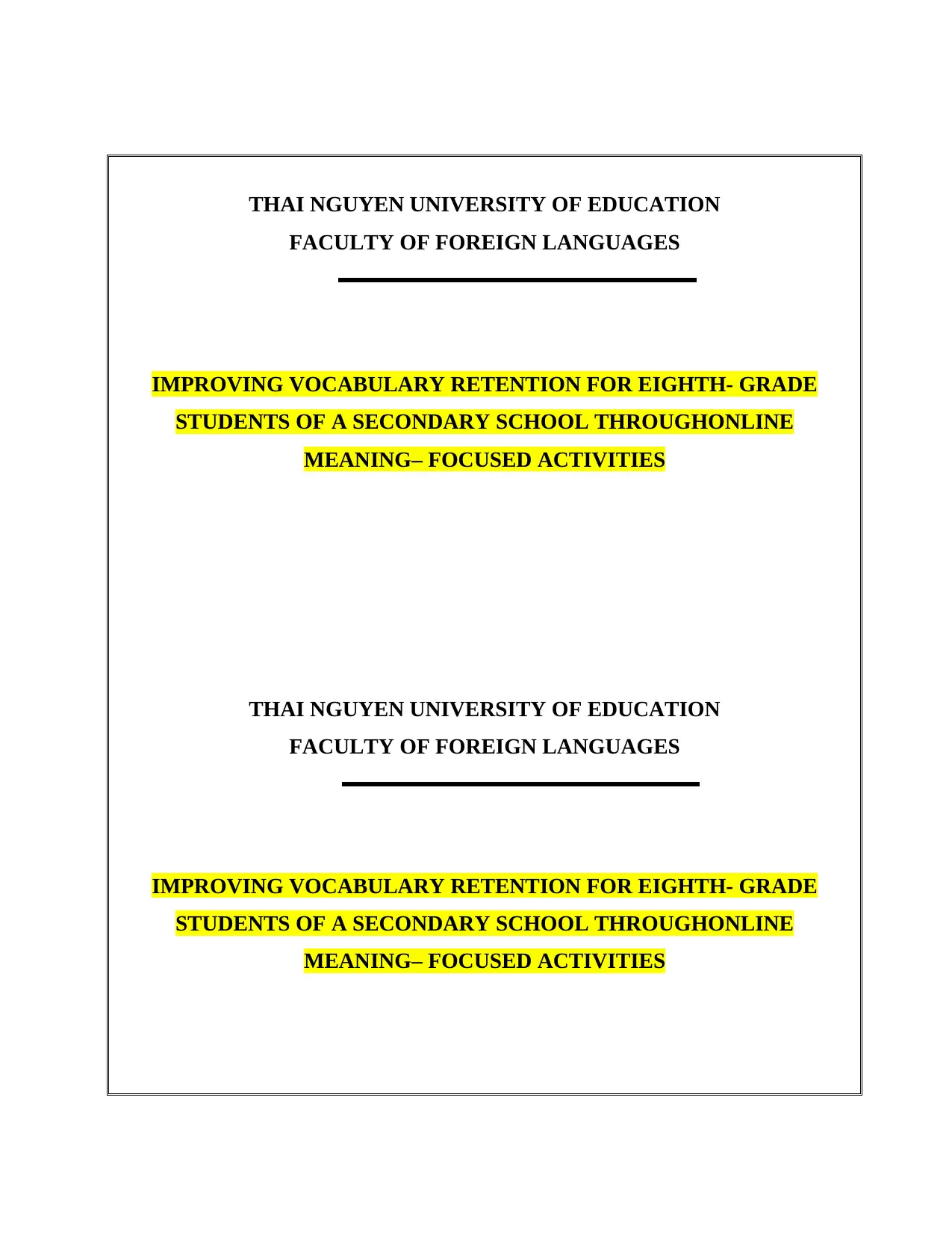
THAI NGUYEN UNIVERSITY OF EDUCATION
FACULTY OF FOREIGN LANGUAGES
IMPROVING VOCABULARY RETENTION FOR EIGHTH- GRADE
STUDENTS OF A SECONDARY SCHOOL THROUGHONLINE
MEANING– FOCUSED ACTIVITIES
THAI NGUYEN UNIVERSITY OF EDUCATION
FACULTY OF FOREIGN LANGUAGES
IMPROVING VOCABULARY RETENTION FOR EIGHTH- GRADE
STUDENTS OF A SECONDARY SCHOOL THROUGHONLINE
MEANING– FOCUSED ACTIVITIES
FACULTY OF FOREIGN LANGUAGES
IMPROVING VOCABULARY RETENTION FOR EIGHTH- GRADE
STUDENTS OF A SECONDARY SCHOOL THROUGHONLINE
MEANING– FOCUSED ACTIVITIES
THAI NGUYEN UNIVERSITY OF EDUCATION
FACULTY OF FOREIGN LANGUAGES
IMPROVING VOCABULARY RETENTION FOR EIGHTH- GRADE
STUDENTS OF A SECONDARY SCHOOL THROUGHONLINE
MEANING– FOCUSED ACTIVITIES
Paraphrase This Document
Need a fresh take? Get an instant paraphrase of this document with our AI Paraphraser
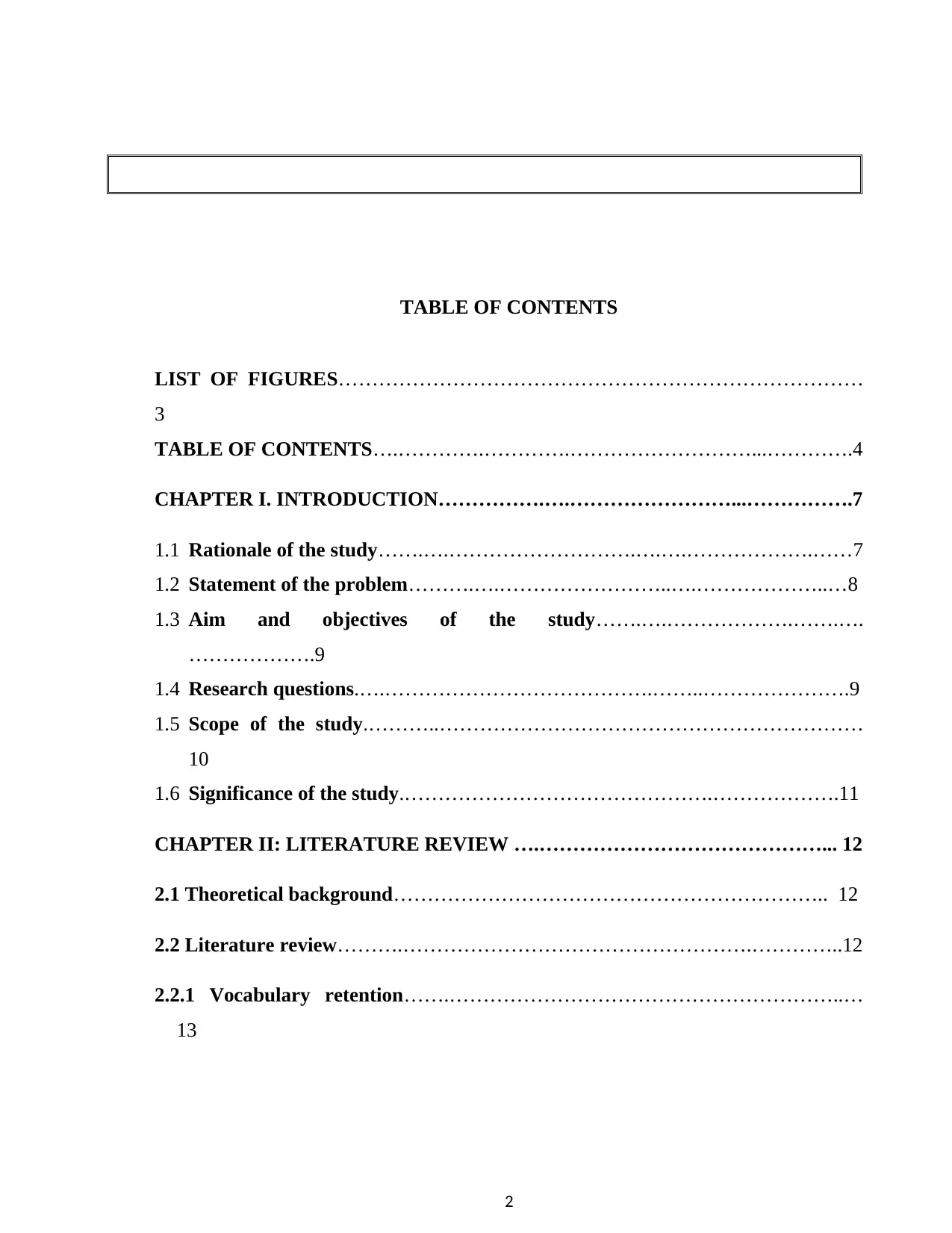
TABLE OF CONTENTS
LIST OF FIGURES……………………………………………………………………
3
TABLE OF CONTENTS….………….………….………………………...………….4
CHAPTER I. INTRODUCTION…………….….……………………...…………….7
1.1 Rationale of the study…….….……………………….….….……………….……7
1.2 Statement of the problem……….….……………………..….………………..…8
1.3 Aim and objectives of the study…….….……………….…….….
……………….9
1.4 Research questions.….………………………………….……..………………….9
1.5 Scope of the study.………..………………………………………………………
10
1.6 Significance of the study.……………………………………….……………….11
CHAPTER II: LITERATURE REVIEW ….……………………………………... 12
2.1 Theoretical background……………………………………………………….. 12
2.2 Literature review……….…………………………………………….…………..12
2.2.1 Vocabulary retention…….…………………………………………………..…
13
2
LIST OF FIGURES……………………………………………………………………
3
TABLE OF CONTENTS….………….………….………………………...………….4
CHAPTER I. INTRODUCTION…………….….……………………...…………….7
1.1 Rationale of the study…….….……………………….….….……………….……7
1.2 Statement of the problem……….….……………………..….………………..…8
1.3 Aim and objectives of the study…….….……………….…….….
……………….9
1.4 Research questions.….………………………………….……..………………….9
1.5 Scope of the study.………..………………………………………………………
10
1.6 Significance of the study.……………………………………….……………….11
CHAPTER II: LITERATURE REVIEW ….……………………………………... 12
2.1 Theoretical background……………………………………………………….. 12
2.2 Literature review……….…………………………………………….…………..12
2.2.1 Vocabulary retention…….…………………………………………………..…
13
2
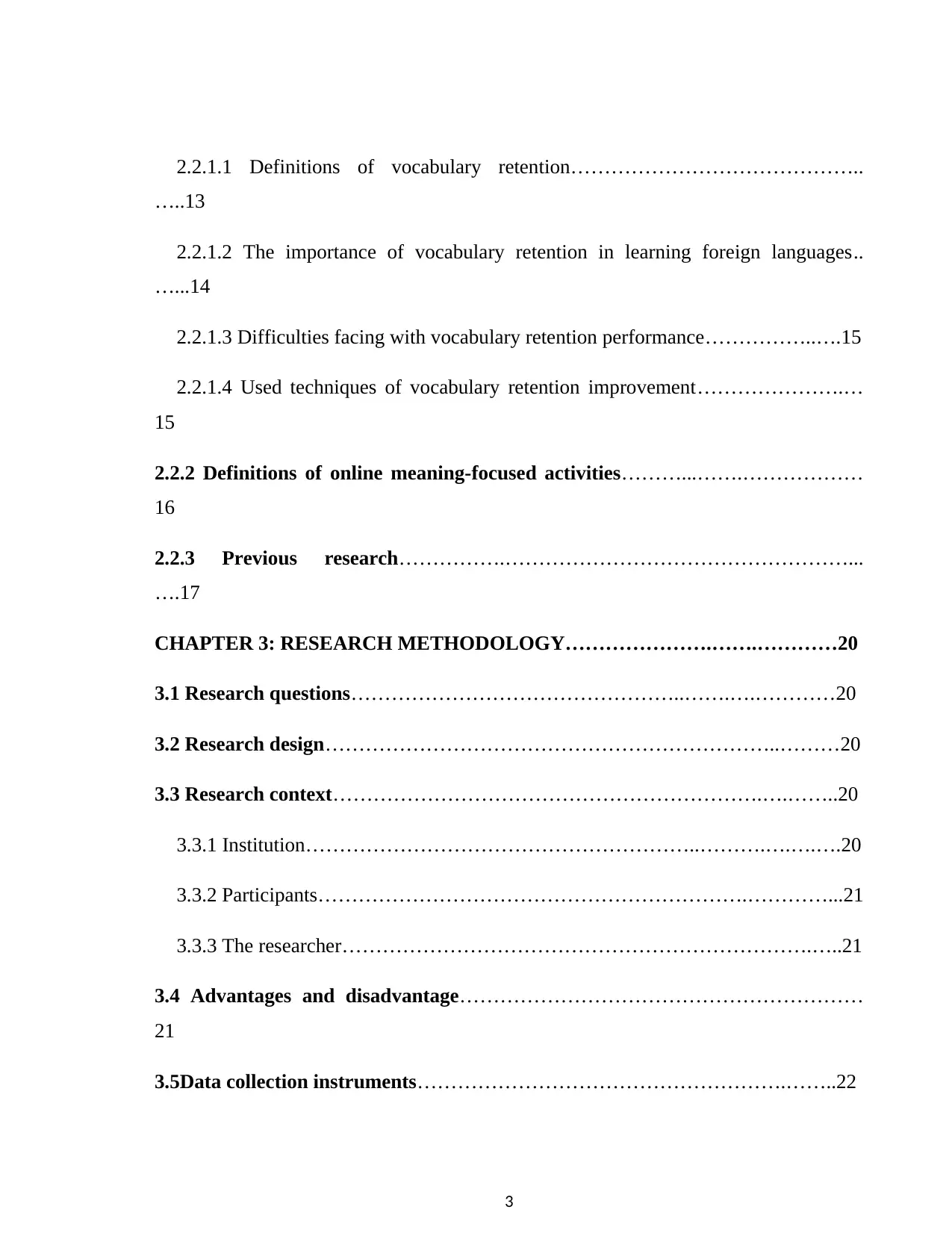
2.2.1.1 Definitions of vocabulary retention……………………………………..
…..13
2.2.1.2 The importance of vocabulary retention in learning foreign languages..
…...14
2.2.1.3 Difficulties facing with vocabulary retention performance……………..….15
2.2.1.4 Used techniques of vocabulary retention improvement………………….…
15
2.2.2 Definitions of online meaning-focused activities………...…….………………
16
2.2.3 Previous research…………….……………………………………………...
….17
CHAPTER 3: RESEARCH METHODOLOGY………………….…….…………20
3.1 Research questions…………………………………………..…….….…………20
3.2 Research design…………………………………………………………..………20
3.3 Research context……………………………………………………….….……..20
3.3.1 Institution…………………………………………………..……….….….….20
3.3.2 Participants……………………………………………………….…………...21
3.3.3 The researcher…………………………………………………………….…..21
3.4 Advantages and disadvantage……………………………………………………
21
3.5Data collection instruments……………………………………………….……..22
3
…..13
2.2.1.2 The importance of vocabulary retention in learning foreign languages..
…...14
2.2.1.3 Difficulties facing with vocabulary retention performance……………..….15
2.2.1.4 Used techniques of vocabulary retention improvement………………….…
15
2.2.2 Definitions of online meaning-focused activities………...…….………………
16
2.2.3 Previous research…………….……………………………………………...
….17
CHAPTER 3: RESEARCH METHODOLOGY………………….…….…………20
3.1 Research questions…………………………………………..…….….…………20
3.2 Research design…………………………………………………………..………20
3.3 Research context……………………………………………………….….……..20
3.3.1 Institution…………………………………………………..……….….….….20
3.3.2 Participants……………………………………………………….…………...21
3.3.3 The researcher…………………………………………………………….…..21
3.4 Advantages and disadvantage……………………………………………………
21
3.5Data collection instruments……………………………………………….……..22
3
⊘ This is a preview!⊘
Do you want full access?
Subscribe today to unlock all pages.

Trusted by 1+ million students worldwide
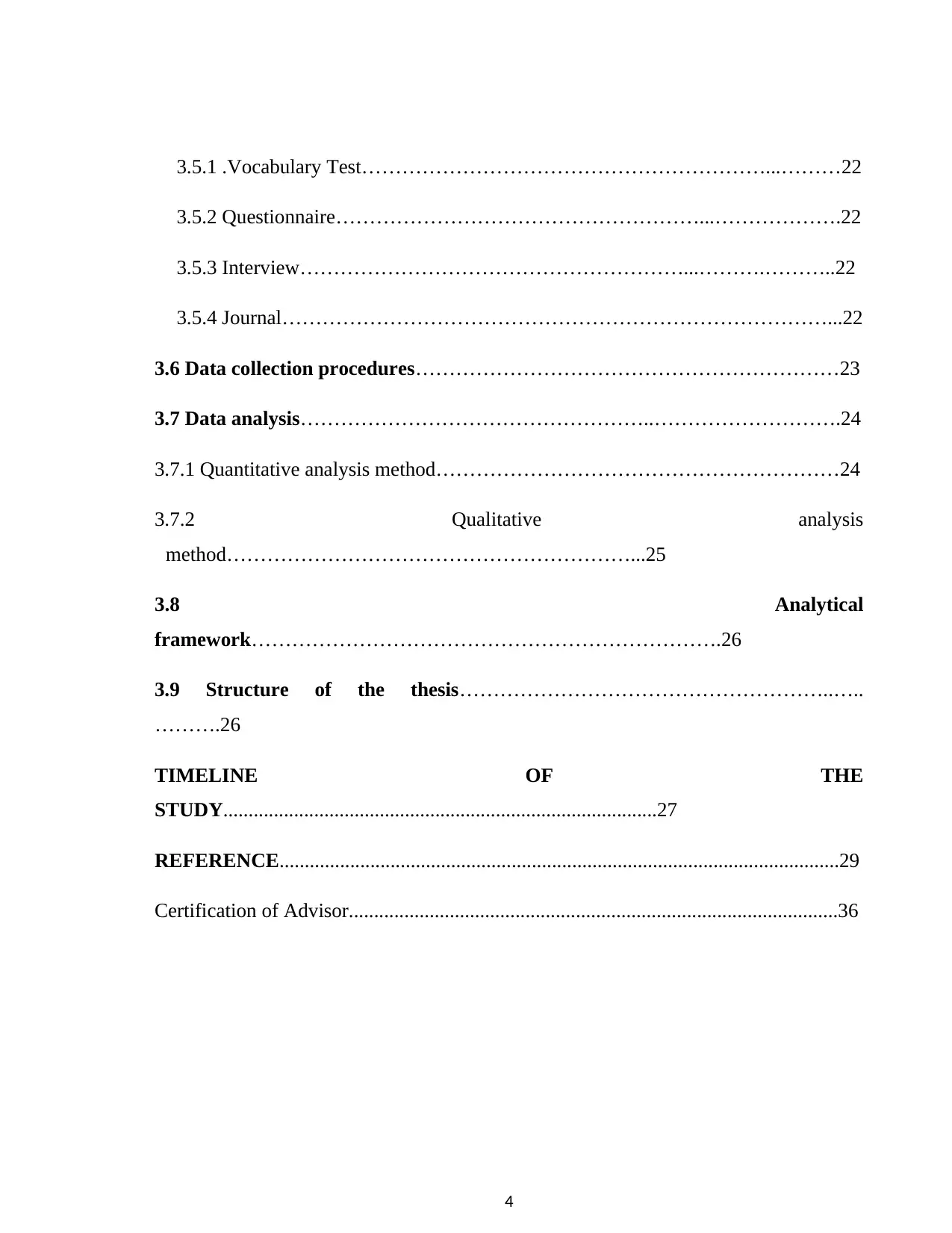
3.5.1 .Vocabulary Test……………………………………………………...………22
3.5.2 Questionnaire………………………………………………...……………….22
3.5.3 Interview…………………………………………………...……….………..22
3.5.4 Journal………………………………………………………………………...22
3.6 Data collection procedures………………………………………………………23
3.7 Data analysis……………………………………………..……………………….24
3.7.1 Quantitative analysis method……………………………………………………24
3.7.2 Qualitative analysis
method……………………………………………………...25
3.8 Analytical
framework…………………………………………………………….26
3.9 Structure of the thesis………………………………………………..…..
……….26
TIMELINE OF THE
STUDY......................................................................................27
REFERENCE...............................................................................................................29
Certification of Advisor.................................................................................................36
4
3.5.2 Questionnaire………………………………………………...……………….22
3.5.3 Interview…………………………………………………...……….………..22
3.5.4 Journal………………………………………………………………………...22
3.6 Data collection procedures………………………………………………………23
3.7 Data analysis……………………………………………..……………………….24
3.7.1 Quantitative analysis method……………………………………………………24
3.7.2 Qualitative analysis
method……………………………………………………...25
3.8 Analytical
framework…………………………………………………………….26
3.9 Structure of the thesis………………………………………………..…..
……….26
TIMELINE OF THE
STUDY......................................................................................27
REFERENCE...............................................................................................................29
Certification of Advisor.................................................................................................36
4
Paraphrase This Document
Need a fresh take? Get an instant paraphrase of this document with our AI Paraphraser
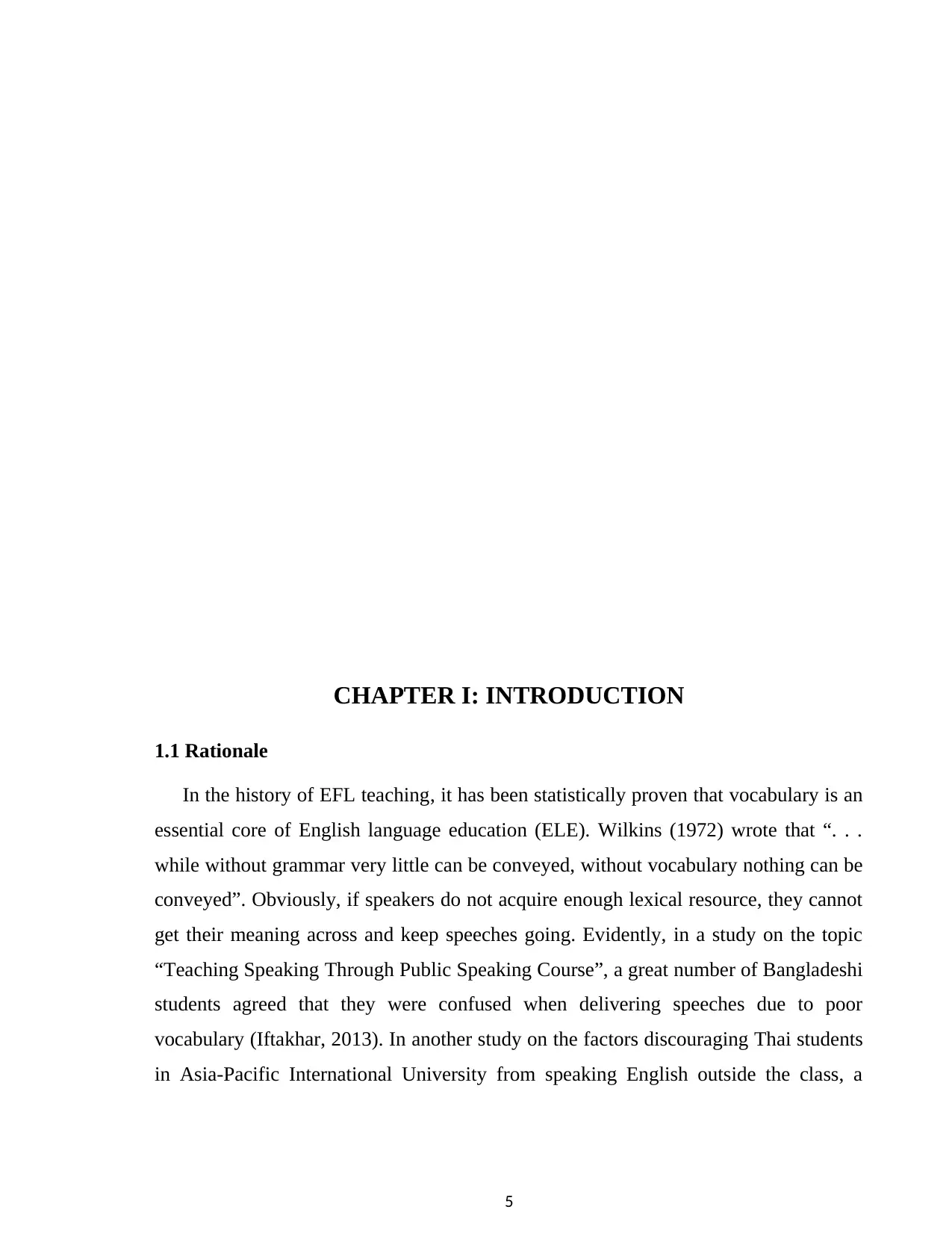
CHAPTER I: INTRODUCTION
1.1 Rationale
In the history of EFL teaching, it has been statistically proven that vocabulary is an
essential core of English language education (ELE). Wilkins (1972) wrote that “. . .
while without grammar very little can be conveyed, without vocabulary nothing can be
conveyed”. Obviously, if speakers do not acquire enough lexical resource, they cannot
get their meaning across and keep speeches going. Evidently, in a study on the topic
“Teaching Speaking Through Public Speaking Course”, a great number of Bangladeshi
students agreed that they were confused when delivering speeches due to poor
vocabulary (Iftakhar, 2013). In another study on the factors discouraging Thai students
in Asia-Pacific International University from speaking English outside the class, a
5
1.1 Rationale
In the history of EFL teaching, it has been statistically proven that vocabulary is an
essential core of English language education (ELE). Wilkins (1972) wrote that “. . .
while without grammar very little can be conveyed, without vocabulary nothing can be
conveyed”. Obviously, if speakers do not acquire enough lexical resource, they cannot
get their meaning across and keep speeches going. Evidently, in a study on the topic
“Teaching Speaking Through Public Speaking Course”, a great number of Bangladeshi
students agreed that they were confused when delivering speeches due to poor
vocabulary (Iftakhar, 2013). In another study on the factors discouraging Thai students
in Asia-Pacific International University from speaking English outside the class, a
5
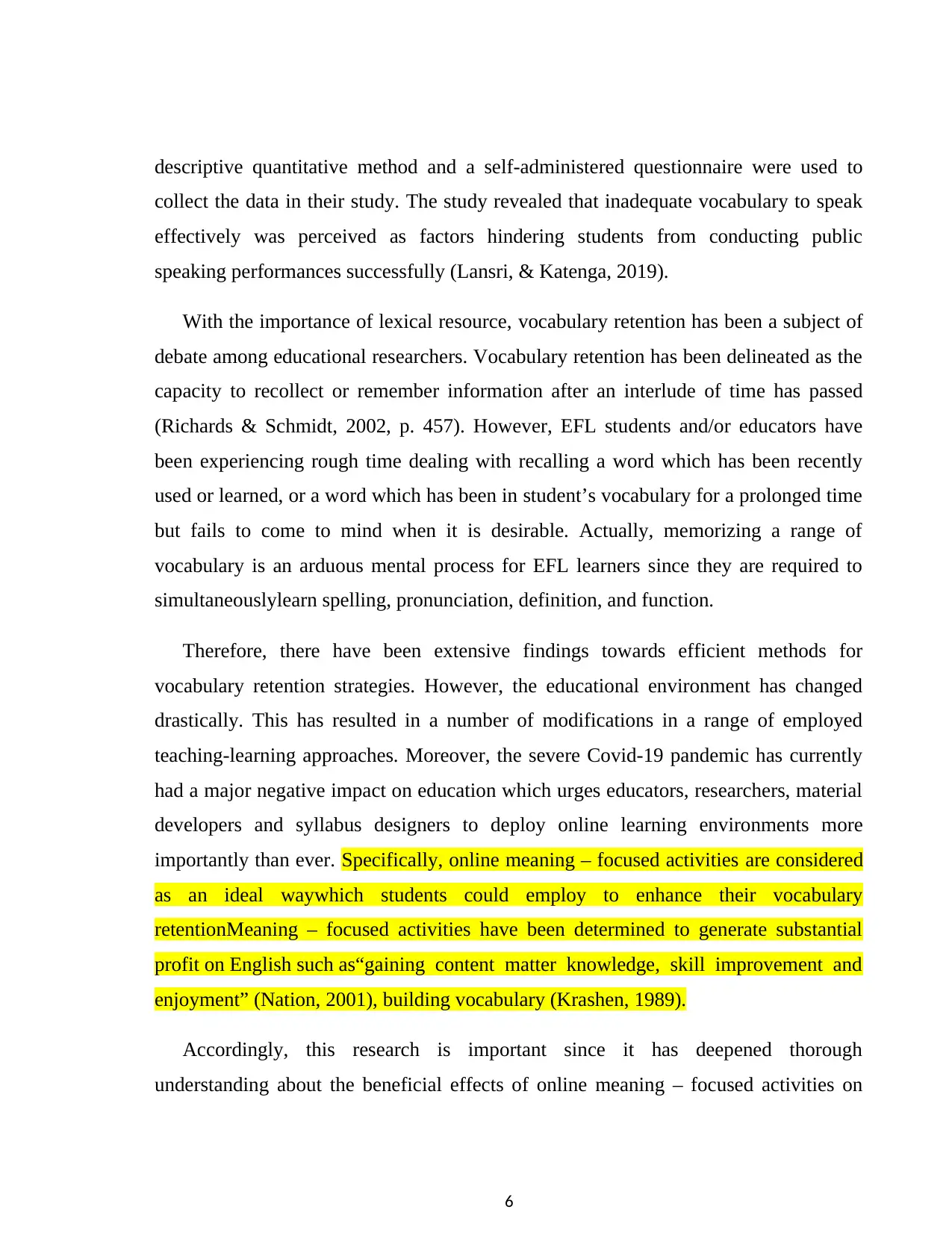
descriptive quantitative method and a self-administered questionnaire were used to
collect the data in their study. The study revealed that inadequate vocabulary to speak
effectively was perceived as factors hindering students from conducting public
speaking performances successfully (Lansri, & Katenga, 2019).
With the importance of lexical resource, vocabulary retention has been a subject of
debate among educational researchers. Vocabulary retention has been delineated as the
capacity to recollect or remember information after an interlude of time has passed
(Richards & Schmidt, 2002, p. 457). However, EFL students and/or educators have
been experiencing rough time dealing with recalling a word which has been recently
used or learned, or a word which has been in student’s vocabulary for a prolonged time
but fails to come to mind when it is desirable. Actually, memorizing a range of
vocabulary is an arduous mental process for EFL learners since they are required to
simultaneouslylearn spelling, pronunciation, definition, and function.
Therefore, there have been extensive findings towards efficient methods for
vocabulary retention strategies. However, the educational environment has changed
drastically. This has resulted in a number of modifications in a range of employed
teaching-learning approaches. Moreover, the severe Covid-19 pandemic has currently
had a major negative impact on education which urges educators, researchers, material
developers and syllabus designers to deploy online learning environments more
importantly than ever. Specifically, online meaning – focused activities are considered
as an ideal waywhich students could employ to enhance their vocabulary
retentionMeaning – focused activities have been determined to generate substantial
profit on English such as“gaining content matter knowledge, skill improvement and
enjoyment” (Nation, 2001), building vocabulary (Krashen, 1989).
Accordingly, this research is important since it has deepened thorough
understanding about the beneficial effects of online meaning – focused activities on
6
collect the data in their study. The study revealed that inadequate vocabulary to speak
effectively was perceived as factors hindering students from conducting public
speaking performances successfully (Lansri, & Katenga, 2019).
With the importance of lexical resource, vocabulary retention has been a subject of
debate among educational researchers. Vocabulary retention has been delineated as the
capacity to recollect or remember information after an interlude of time has passed
(Richards & Schmidt, 2002, p. 457). However, EFL students and/or educators have
been experiencing rough time dealing with recalling a word which has been recently
used or learned, or a word which has been in student’s vocabulary for a prolonged time
but fails to come to mind when it is desirable. Actually, memorizing a range of
vocabulary is an arduous mental process for EFL learners since they are required to
simultaneouslylearn spelling, pronunciation, definition, and function.
Therefore, there have been extensive findings towards efficient methods for
vocabulary retention strategies. However, the educational environment has changed
drastically. This has resulted in a number of modifications in a range of employed
teaching-learning approaches. Moreover, the severe Covid-19 pandemic has currently
had a major negative impact on education which urges educators, researchers, material
developers and syllabus designers to deploy online learning environments more
importantly than ever. Specifically, online meaning – focused activities are considered
as an ideal waywhich students could employ to enhance their vocabulary
retentionMeaning – focused activities have been determined to generate substantial
profit on English such as“gaining content matter knowledge, skill improvement and
enjoyment” (Nation, 2001), building vocabulary (Krashen, 1989).
Accordingly, this research is important since it has deepened thorough
understanding about the beneficial effects of online meaning – focused activities on
6
⊘ This is a preview!⊘
Do you want full access?
Subscribe today to unlock all pages.

Trusted by 1+ million students worldwide
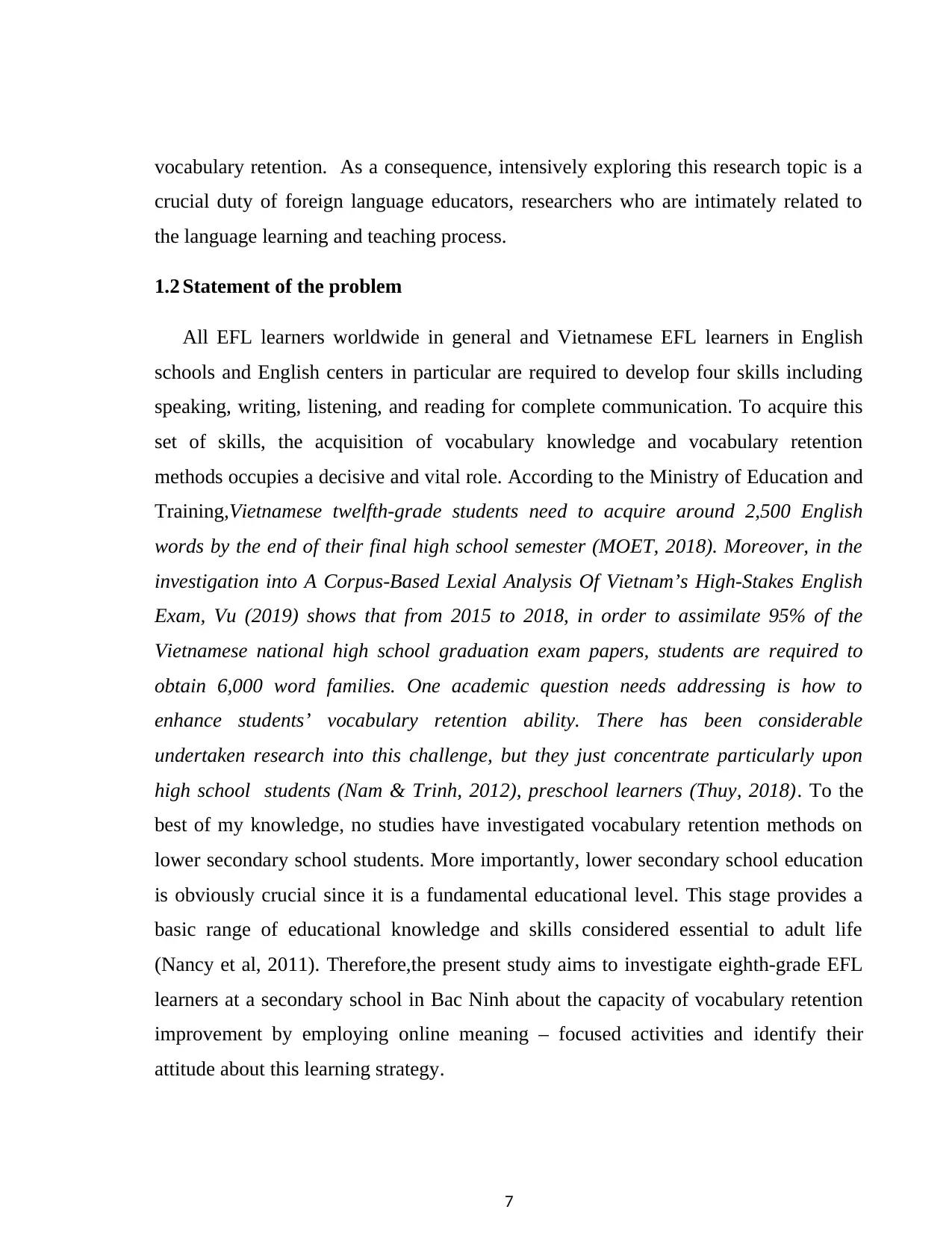
vocabulary retention. As a consequence, intensively exploring this research topic is a
crucial duty of foreign language educators, researchers who are intimately related to
the language learning and teaching process.
1.2 Statement of the problem
All EFL learners worldwide in general and Vietnamese EFL learners in English
schools and English centers in particular are required to develop four skills including
speaking, writing, listening, and reading for complete communication. To acquire this
set of skills, the acquisition of vocabulary knowledge and vocabulary retention
methods occupies a decisive and vital role. According to the Ministry of Education and
Training,Vietnamese twelfth-grade students need to acquire around 2,500 English
words by the end of their final high school semester (MOET, 2018). Moreover, in the
investigation into A Corpus-Based Lexial Analysis Of Vietnam’s High-Stakes English
Exam, Vu (2019) shows that from 2015 to 2018, in order to assimilate 95% of the
Vietnamese national high school graduation exam papers, students are required to
obtain 6,000 word families. One academic question needs addressing is how to
enhance students’ vocabulary retention ability. There has been considerable
undertaken research into this challenge, but they just concentrate particularly upon
high school students (Nam & Trinh, 2012), preschool learners (Thuy, 2018). To the
best of my knowledge, no studies have investigated vocabulary retention methods on
lower secondary school students. More importantly, lower secondary school education
is obviously crucial since it is a fundamental educational level. This stage provides a
basic range of educational knowledge and skills considered essential to adult life
(Nancy et al, 2011). Therefore,the present study aims to investigate eighth-grade EFL
learners at a secondary school in Bac Ninh about the capacity of vocabulary retention
improvement by employing online meaning – focused activities and identify their
attitude about this learning strategy.
7
crucial duty of foreign language educators, researchers who are intimately related to
the language learning and teaching process.
1.2 Statement of the problem
All EFL learners worldwide in general and Vietnamese EFL learners in English
schools and English centers in particular are required to develop four skills including
speaking, writing, listening, and reading for complete communication. To acquire this
set of skills, the acquisition of vocabulary knowledge and vocabulary retention
methods occupies a decisive and vital role. According to the Ministry of Education and
Training,Vietnamese twelfth-grade students need to acquire around 2,500 English
words by the end of their final high school semester (MOET, 2018). Moreover, in the
investigation into A Corpus-Based Lexial Analysis Of Vietnam’s High-Stakes English
Exam, Vu (2019) shows that from 2015 to 2018, in order to assimilate 95% of the
Vietnamese national high school graduation exam papers, students are required to
obtain 6,000 word families. One academic question needs addressing is how to
enhance students’ vocabulary retention ability. There has been considerable
undertaken research into this challenge, but they just concentrate particularly upon
high school students (Nam & Trinh, 2012), preschool learners (Thuy, 2018). To the
best of my knowledge, no studies have investigated vocabulary retention methods on
lower secondary school students. More importantly, lower secondary school education
is obviously crucial since it is a fundamental educational level. This stage provides a
basic range of educational knowledge and skills considered essential to adult life
(Nancy et al, 2011). Therefore,the present study aims to investigate eighth-grade EFL
learners at a secondary school in Bac Ninh about the capacity of vocabulary retention
improvement by employing online meaning – focused activities and identify their
attitude about this learning strategy.
7
Paraphrase This Document
Need a fresh take? Get an instant paraphrase of this document with our AI Paraphraser
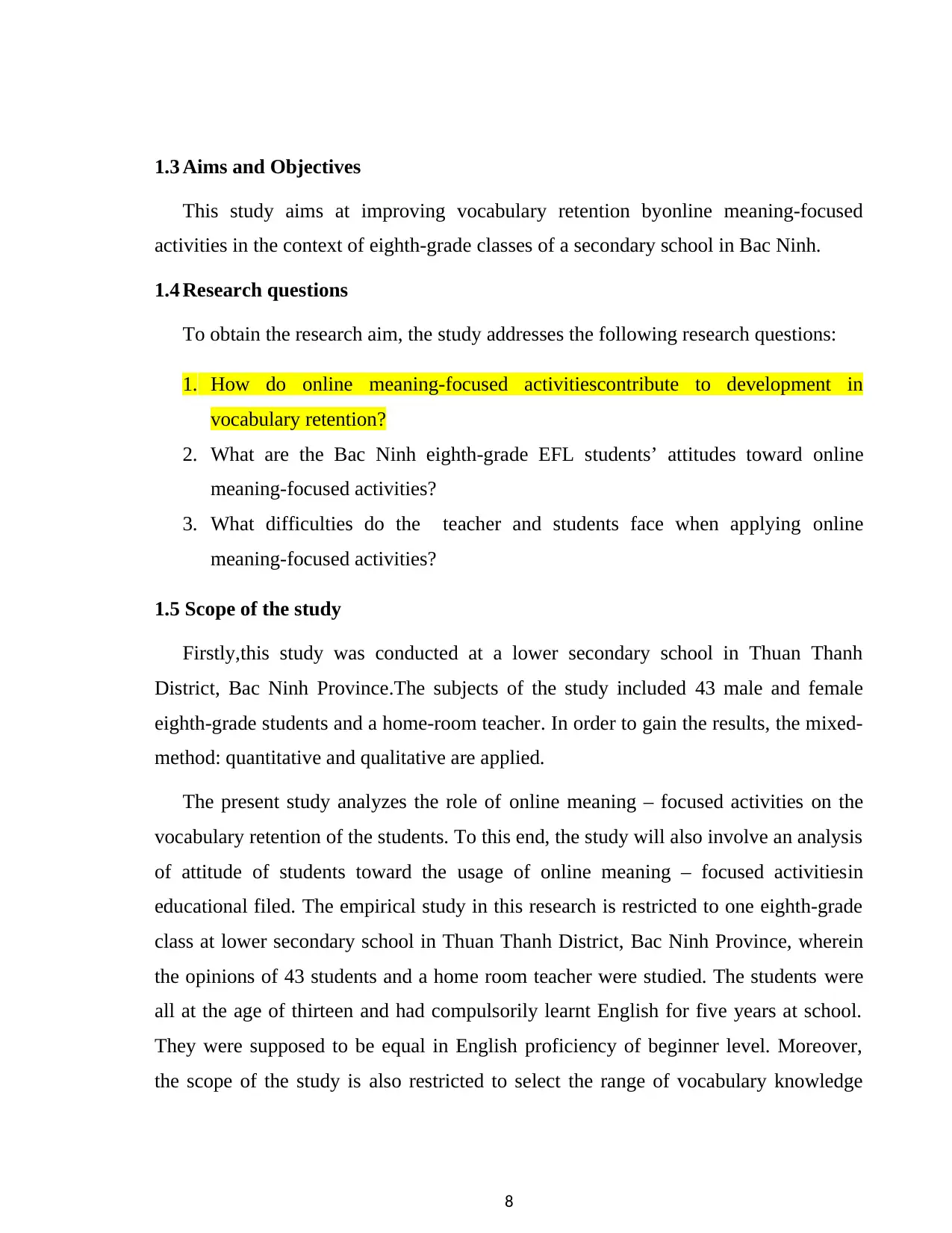
1.3 Aims and Objectives
This study aims at improving vocabulary retention byonline meaning-focused
activities in the context of eighth-grade classes of a secondary school in Bac Ninh.
1.4 Research questions
To obtain the research aim, the study addresses the following research questions:
1. How do online meaning-focused activitiescontribute to development in
vocabulary retention?
2. What are the Bac Ninh eighth-grade EFL students’ attitudes toward online
meaning-focused activities?
3. What difficulties do the teacher and students face when applying online
meaning-focused activities?
1.5 Scope of the study
Firstly,this study was conducted at a lower secondary school in Thuan Thanh
District, Bac Ninh Province.The subjects of the study included 43 male and female
eighth-grade students and a home-room teacher. In order to gain the results, the mixed-
method: quantitative and qualitative are applied.
The present study analyzes the role of online meaning – focused activities on the
vocabulary retention of the students. To this end, the study will also involve an analysis
of attitude of students toward the usage of online meaning – focused activitiesin
educational filed. The empirical study in this research is restricted to one eighth-grade
class at lower secondary school in Thuan Thanh District, Bac Ninh Province, wherein
the opinions of 43 students and a home room teacher were studied. The students were
all at the age of thirteen and had compulsorily learnt English for five years at school.
They were supposed to be equal in English proficiency of beginner level. Moreover,
the scope of the study is also restricted to select the range of vocabulary knowledge
8
This study aims at improving vocabulary retention byonline meaning-focused
activities in the context of eighth-grade classes of a secondary school in Bac Ninh.
1.4 Research questions
To obtain the research aim, the study addresses the following research questions:
1. How do online meaning-focused activitiescontribute to development in
vocabulary retention?
2. What are the Bac Ninh eighth-grade EFL students’ attitudes toward online
meaning-focused activities?
3. What difficulties do the teacher and students face when applying online
meaning-focused activities?
1.5 Scope of the study
Firstly,this study was conducted at a lower secondary school in Thuan Thanh
District, Bac Ninh Province.The subjects of the study included 43 male and female
eighth-grade students and a home-room teacher. In order to gain the results, the mixed-
method: quantitative and qualitative are applied.
The present study analyzes the role of online meaning – focused activities on the
vocabulary retention of the students. To this end, the study will also involve an analysis
of attitude of students toward the usage of online meaning – focused activitiesin
educational filed. The empirical study in this research is restricted to one eighth-grade
class at lower secondary school in Thuan Thanh District, Bac Ninh Province, wherein
the opinions of 43 students and a home room teacher were studied. The students were
all at the age of thirteen and had compulsorily learnt English for five years at school.
They were supposed to be equal in English proficiency of beginner level. Moreover,
the scope of the study is also restricted to select the range of vocabulary knowledge
8
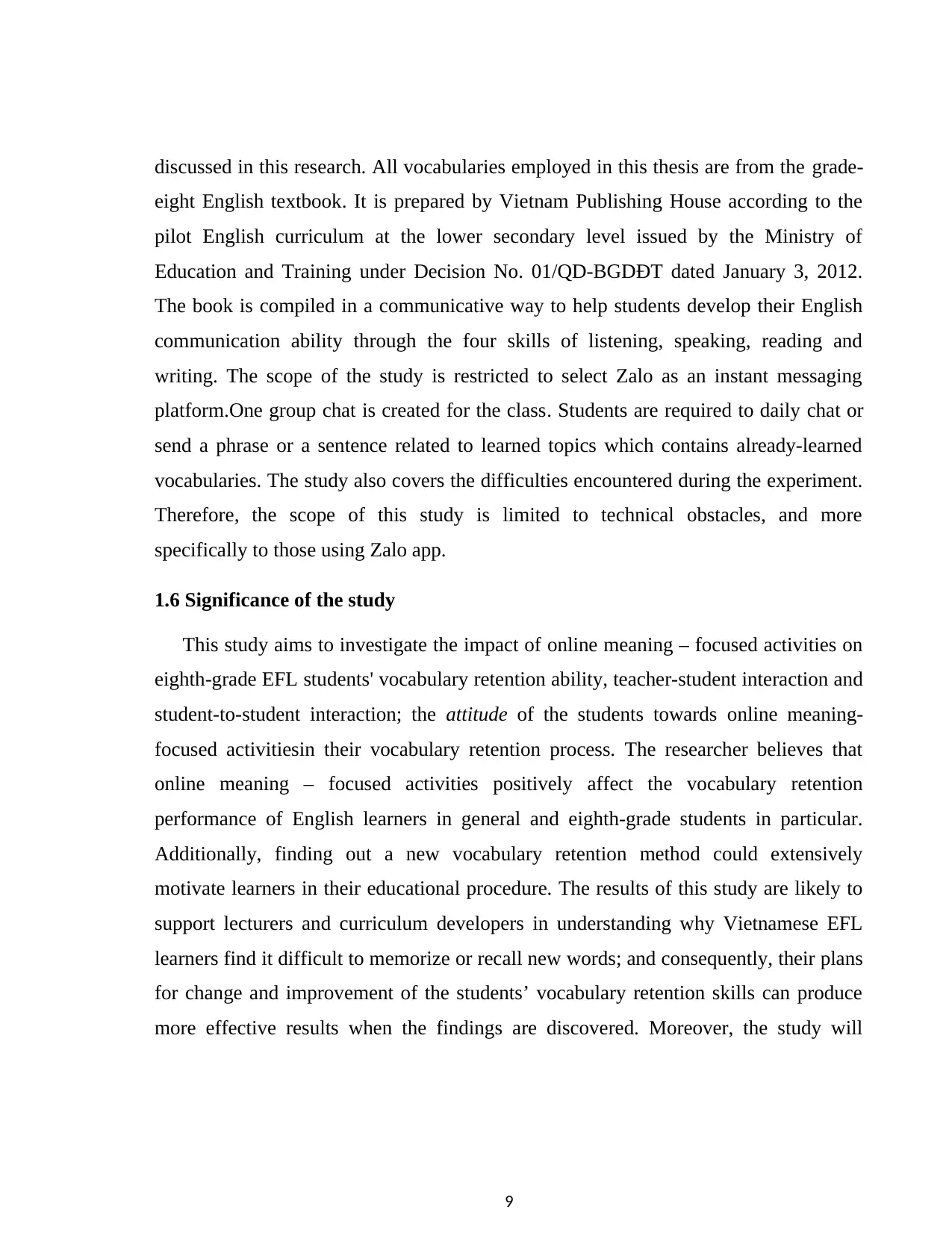
discussed in this research. All vocabularies employed in this thesis are from the grade-
eight English textbook. It is prepared by Vietnam Publishing House according to the
pilot English curriculum at the lower secondary level issued by the Ministry of
Education and Training under Decision No. 01/QD-BGDĐT dated January 3, 2012.
The book is compiled in a communicative way to help students develop their English
communication ability through the four skills of listening, speaking, reading and
writing. The scope of the study is restricted to select Zalo as an instant messaging
platform.One group chat is created for the class. Students are required to daily chat or
send a phrase or a sentence related to learned topics which contains already-learned
vocabularies. The study also covers the difficulties encountered during the experiment.
Therefore, the scope of this study is limited to technical obstacles, and more
specifically to those using Zalo app.
1.6 Significance of the study
This study aims to investigate the impact of online meaning – focused activities on
eighth-grade EFL students' vocabulary retention ability, teacher-student interaction and
student-to-student interaction; the attitude of the students towards online meaning-
focused activitiesin their vocabulary retention process. The researcher believes that
online meaning – focused activities positively affect the vocabulary retention
performance of English learners in general and eighth-grade students in particular.
Additionally, finding out a new vocabulary retention method could extensively
motivate learners in their educational procedure. The results of this study are likely to
support lecturers and curriculum developers in understanding why Vietnamese EFL
learners find it difficult to memorize or recall new words; and consequently, their plans
for change and improvement of the students’ vocabulary retention skills can produce
more effective results when the findings are discovered. Moreover, the study will
9
eight English textbook. It is prepared by Vietnam Publishing House according to the
pilot English curriculum at the lower secondary level issued by the Ministry of
Education and Training under Decision No. 01/QD-BGDĐT dated January 3, 2012.
The book is compiled in a communicative way to help students develop their English
communication ability through the four skills of listening, speaking, reading and
writing. The scope of the study is restricted to select Zalo as an instant messaging
platform.One group chat is created for the class. Students are required to daily chat or
send a phrase or a sentence related to learned topics which contains already-learned
vocabularies. The study also covers the difficulties encountered during the experiment.
Therefore, the scope of this study is limited to technical obstacles, and more
specifically to those using Zalo app.
1.6 Significance of the study
This study aims to investigate the impact of online meaning – focused activities on
eighth-grade EFL students' vocabulary retention ability, teacher-student interaction and
student-to-student interaction; the attitude of the students towards online meaning-
focused activitiesin their vocabulary retention process. The researcher believes that
online meaning – focused activities positively affect the vocabulary retention
performance of English learners in general and eighth-grade students in particular.
Additionally, finding out a new vocabulary retention method could extensively
motivate learners in their educational procedure. The results of this study are likely to
support lecturers and curriculum developers in understanding why Vietnamese EFL
learners find it difficult to memorize or recall new words; and consequently, their plans
for change and improvement of the students’ vocabulary retention skills can produce
more effective results when the findings are discovered. Moreover, the study will
9
⊘ This is a preview!⊘
Do you want full access?
Subscribe today to unlock all pages.

Trusted by 1+ million students worldwide
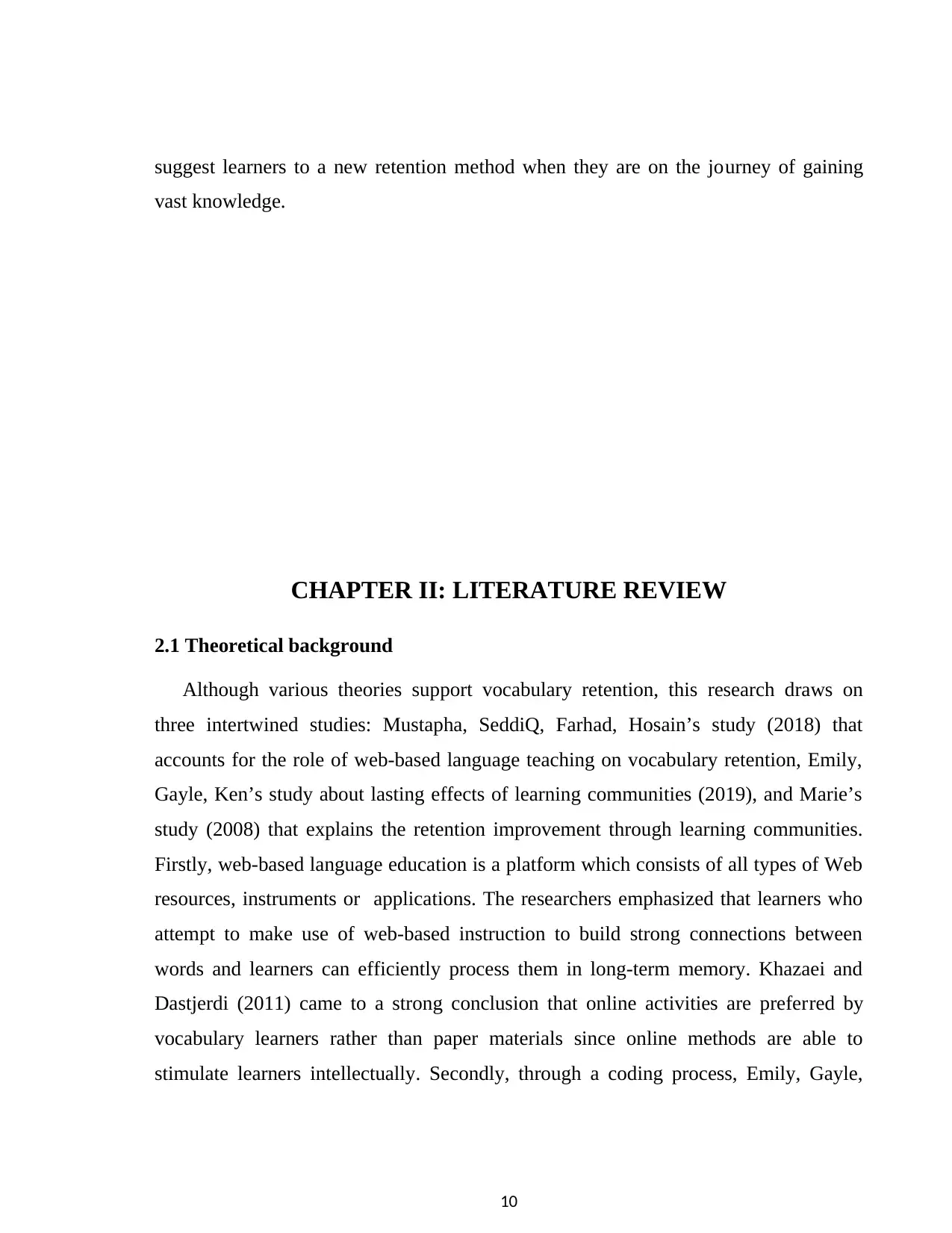
suggest learners to a new retention method when they are on the journey of gaining
vast knowledge.
CHAPTER II: LITERATURE REVIEW
2.1 Theoretical background
Although various theories support vocabulary retention, this research draws on
three intertwined studies: Mustapha, SeddiQ, Farhad, Hosain’s study (2018) that
accounts for the role of web-based language teaching on vocabulary retention, Emily,
Gayle, Ken’s study about lasting effects of learning communities (2019), and Marie’s
study (2008) that explains the retention improvement through learning communities.
Firstly, web-based language education is a platform which consists of all types of Web
resources, instruments or applications. The researchers emphasized that learners who
attempt to make use of web-based instruction to build strong connections between
words and learners can efficiently process them in long-term memory. Khazaei and
Dastjerdi (2011) came to a strong conclusion that online activities are preferred by
vocabulary learners rather than paper materials since online methods are able to
stimulate learners intellectually. Secondly, through a coding process, Emily, Gayle,
10
vast knowledge.
CHAPTER II: LITERATURE REVIEW
2.1 Theoretical background
Although various theories support vocabulary retention, this research draws on
three intertwined studies: Mustapha, SeddiQ, Farhad, Hosain’s study (2018) that
accounts for the role of web-based language teaching on vocabulary retention, Emily,
Gayle, Ken’s study about lasting effects of learning communities (2019), and Marie’s
study (2008) that explains the retention improvement through learning communities.
Firstly, web-based language education is a platform which consists of all types of Web
resources, instruments or applications. The researchers emphasized that learners who
attempt to make use of web-based instruction to build strong connections between
words and learners can efficiently process them in long-term memory. Khazaei and
Dastjerdi (2011) came to a strong conclusion that online activities are preferred by
vocabulary learners rather than paper materials since online methods are able to
stimulate learners intellectually. Secondly, through a coding process, Emily, Gayle,
10
Paraphrase This Document
Need a fresh take? Get an instant paraphrase of this document with our AI Paraphraser
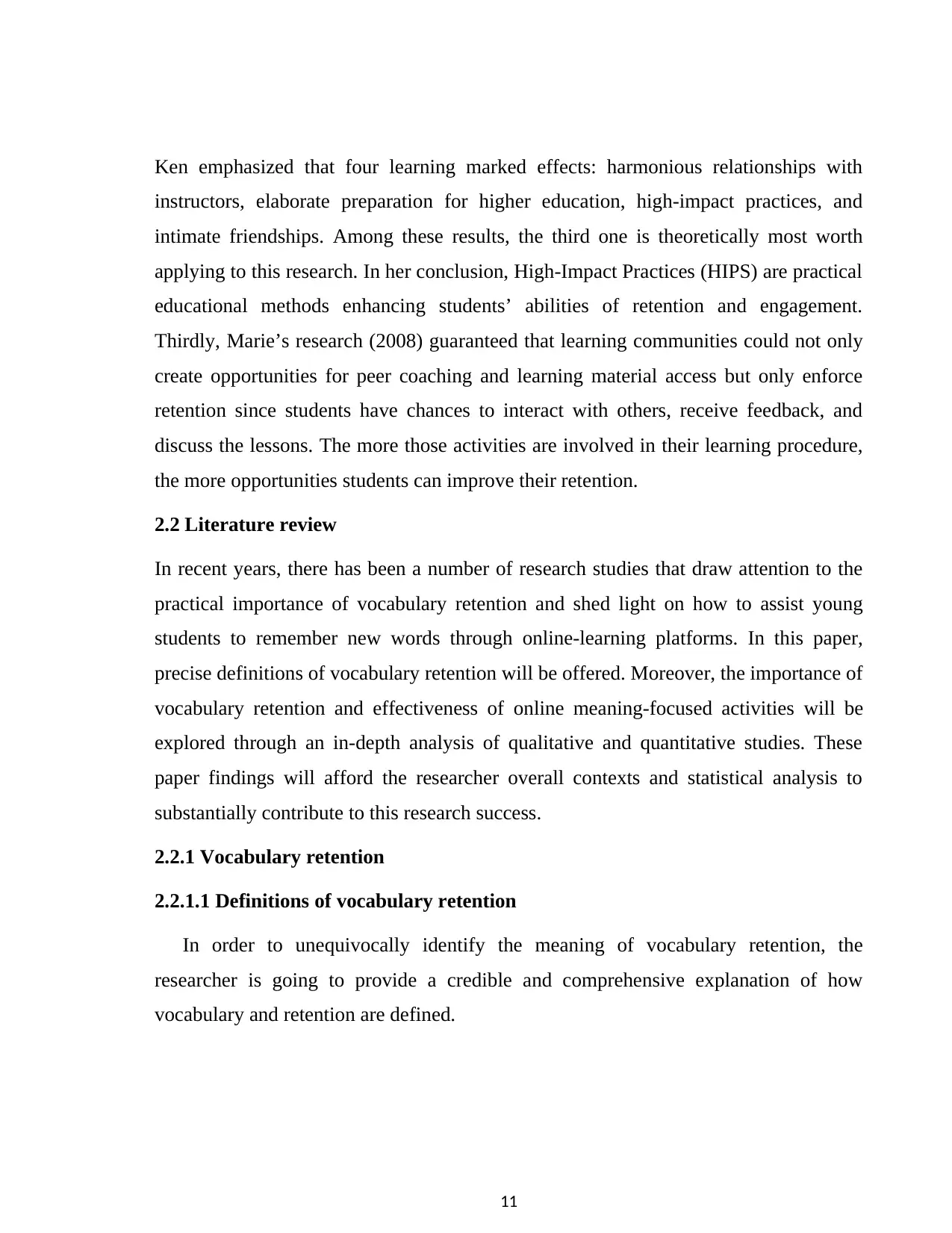
Ken emphasized that four learning marked effects: harmonious relationships with
instructors, elaborate preparation for higher education, high-impact practices, and
intimate friendships. Among these results, the third one is theoretically most worth
applying to this research. In her conclusion, High-Impact Practices (HIPS) are practical
educational methods enhancing students’ abilities of retention and engagement.
Thirdly, Marie’s research (2008) guaranteed that learning communities could not only
create opportunities for peer coaching and learning material access but only enforce
retention since students have chances to interact with others, receive feedback, and
discuss the lessons. The more those activities are involved in their learning procedure,
the more opportunities students can improve their retention.
2.2 Literature review
In recent years, there has been a number of research studies that draw attention to the
practical importance of vocabulary retention and shed light on how to assist young
students to remember new words through online-learning platforms. In this paper,
precise definitions of vocabulary retention will be offered. Moreover, the importance of
vocabulary retention and effectiveness of online meaning-focused activities will be
explored through an in-depth analysis of qualitative and quantitative studies. These
paper findings will afford the researcher overall contexts and statistical analysis to
substantially contribute to this research success.
2.2.1 Vocabulary retention
2.2.1.1 Definitions of vocabulary retention
In order to unequivocally identify the meaning of vocabulary retention, the
researcher is going to provide a credible and comprehensive explanation of how
vocabulary and retention are defined.
11
instructors, elaborate preparation for higher education, high-impact practices, and
intimate friendships. Among these results, the third one is theoretically most worth
applying to this research. In her conclusion, High-Impact Practices (HIPS) are practical
educational methods enhancing students’ abilities of retention and engagement.
Thirdly, Marie’s research (2008) guaranteed that learning communities could not only
create opportunities for peer coaching and learning material access but only enforce
retention since students have chances to interact with others, receive feedback, and
discuss the lessons. The more those activities are involved in their learning procedure,
the more opportunities students can improve their retention.
2.2 Literature review
In recent years, there has been a number of research studies that draw attention to the
practical importance of vocabulary retention and shed light on how to assist young
students to remember new words through online-learning platforms. In this paper,
precise definitions of vocabulary retention will be offered. Moreover, the importance of
vocabulary retention and effectiveness of online meaning-focused activities will be
explored through an in-depth analysis of qualitative and quantitative studies. These
paper findings will afford the researcher overall contexts and statistical analysis to
substantially contribute to this research success.
2.2.1 Vocabulary retention
2.2.1.1 Definitions of vocabulary retention
In order to unequivocally identify the meaning of vocabulary retention, the
researcher is going to provide a credible and comprehensive explanation of how
vocabulary and retention are defined.
11
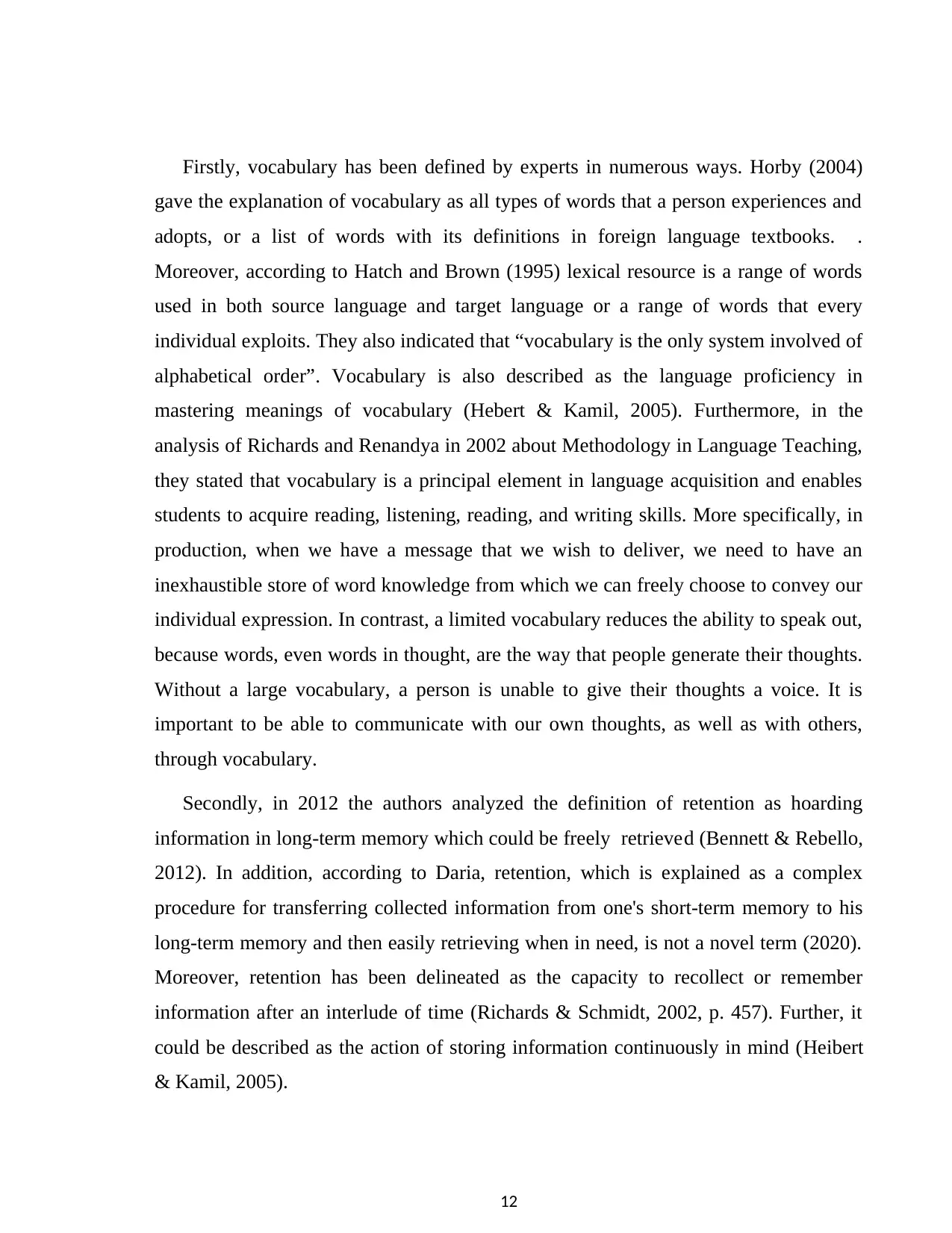
Firstly, vocabulary has been defined by experts in numerous ways. Horby (2004)
gave the explanation of vocabulary as all types of words that a person experiences and
adopts, or a list of words with its definitions in foreign language textbooks. .
Moreover, according to Hatch and Brown (1995) lexical resource is a range of words
used in both source language and target language or a range of words that every
individual exploits. They also indicated that “vocabulary is the only system involved of
alphabetical order”. Vocabulary is also described as the language proficiency in
mastering meanings of vocabulary (Hebert & Kamil, 2005). Furthermore, in the
analysis of Richards and Renandya in 2002 about Methodology in Language Teaching,
they stated that vocabulary is a principal element in language acquisition and enables
students to acquire reading, listening, reading, and writing skills. More specifically, in
production, when we have a message that we wish to deliver, we need to have an
inexhaustible store of word knowledge from which we can freely choose to convey our
individual expression. In contrast, a limited vocabulary reduces the ability to speak out,
because words, even words in thought, are the way that people generate their thoughts.
Without a large vocabulary, a person is unable to give their thoughts a voice. It is
important to be able to communicate with our own thoughts, as well as with others,
through vocabulary.
Secondly, in 2012 the authors analyzed the definition of retention as hoarding
information in long-term memory which could be freely retrieved (Bennett & Rebello,
2012). In addition, according to Daria, retention, which is explained as a complex
procedure for transferring collected information from one's short-term memory to his
long-term memory and then easily retrieving when in need, is not a novel term (2020).
Moreover, retention has been delineated as the capacity to recollect or remember
information after an interlude of time (Richards & Schmidt, 2002, p. 457). Further, it
could be described as the action of storing information continuously in mind (Heibert
& Kamil, 2005).
12
gave the explanation of vocabulary as all types of words that a person experiences and
adopts, or a list of words with its definitions in foreign language textbooks. .
Moreover, according to Hatch and Brown (1995) lexical resource is a range of words
used in both source language and target language or a range of words that every
individual exploits. They also indicated that “vocabulary is the only system involved of
alphabetical order”. Vocabulary is also described as the language proficiency in
mastering meanings of vocabulary (Hebert & Kamil, 2005). Furthermore, in the
analysis of Richards and Renandya in 2002 about Methodology in Language Teaching,
they stated that vocabulary is a principal element in language acquisition and enables
students to acquire reading, listening, reading, and writing skills. More specifically, in
production, when we have a message that we wish to deliver, we need to have an
inexhaustible store of word knowledge from which we can freely choose to convey our
individual expression. In contrast, a limited vocabulary reduces the ability to speak out,
because words, even words in thought, are the way that people generate their thoughts.
Without a large vocabulary, a person is unable to give their thoughts a voice. It is
important to be able to communicate with our own thoughts, as well as with others,
through vocabulary.
Secondly, in 2012 the authors analyzed the definition of retention as hoarding
information in long-term memory which could be freely retrieved (Bennett & Rebello,
2012). In addition, according to Daria, retention, which is explained as a complex
procedure for transferring collected information from one's short-term memory to his
long-term memory and then easily retrieving when in need, is not a novel term (2020).
Moreover, retention has been delineated as the capacity to recollect or remember
information after an interlude of time (Richards & Schmidt, 2002, p. 457). Further, it
could be described as the action of storing information continuously in mind (Heibert
& Kamil, 2005).
12
⊘ This is a preview!⊘
Do you want full access?
Subscribe today to unlock all pages.

Trusted by 1+ million students worldwide
1 out of 32
Related Documents
Your All-in-One AI-Powered Toolkit for Academic Success.
+13062052269
info@desklib.com
Available 24*7 on WhatsApp / Email
![[object Object]](/_next/static/media/star-bottom.7253800d.svg)
Unlock your academic potential
Copyright © 2020–2026 A2Z Services. All Rights Reserved. Developed and managed by ZUCOL.



